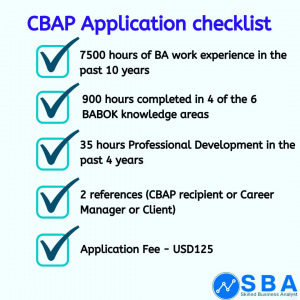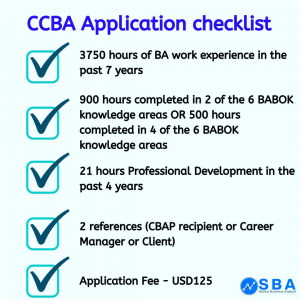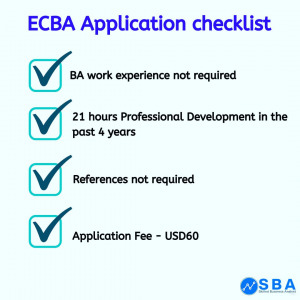Introduction:
The Skilled Business Analyst recently ran an Instagram series on CBAP, CCBA and ECBA application processes. The main aim was to demystify the application process. Before a candidate writes the exam, they need to go through an application process and they will either be approved or pending audit. Because of this, it is extremely important for candidates to ensure they are meticulous with their application.
The application process is generally perceived to be daunting and complex. Potential candidates sometimes get stuck. I myself have been there – it took me almost a year before I finally had the courage to start the process! In this post, I attempt to bring clarity to the steps involved in the application process. If you are about to embark on the application process for any of the certifications, I encourage you to continue to read this post!



1. Business Analysis (BA) work experience
• CBAP requires 7500 hours of BA work experience in the past 10 years
• CCBA requires 3750 hours of BA work experience in the 7 years
• ECBA – no requirement
What is classified as “BA work experience?” In order to answer this let’s turn to the definition of a Business Analyst as per BABOK – A Business Analyst is an agent of change who identifies and articulates the need for change in an organization. Business Analysis is the process of understanding business change needs, assessing the impact of those changes, capturing, analysing and documenting requirements.
Business analysts perform various tasks in different Knowledge Areas in order to articulate the need for the organization. These Knowledge Areas include:
• Requirements Analysis and Design Definition
• Business Analysis Planning and Monitoring
• Elicitation and Collaboration
• Strategy Analysis
• Solution Evaluation
• Requirements Lifecycle Management
Key takeaways:
• BA work experience needs to be in line with the definition of Business Analyst as per the BABOK and a potential candidate must have work experience in the Knowledge Areas.
• This means that a title of a Business Analyst alone is not enough. Some of us are given the title of a Business Analyst by our organizations and yet we don’t fulfill most of the responsibilities as per the KAs. On the other hand, some of us do not have the formal title of Business Analyst and yet we fulfilL most of the responsibilities as described in the KAs. I therefore encourage potential candidates to reflect on their BA work experience in line with the definition and knowledge areas documented above.
2. Hours completed in Knowledge Areas
• CBAP – 900 hours completed in each 4 of the 6 BABOK knowledge areas
• CCBA – 900 hours completed in each 2 of the 6 BABOK knowledge areas OR 500 completed in each 4 of the 6 BABOK areas.
• ECBA – not relevant
This is where due diligence is required as candidates need to look back on their work history and document the number of hours spent in each Knowledge Area. I suggest that before this is done, you compile your own portfolio of evidence. At The Skilled Business Analyst we work closely with our candidates on their portfolio of evidence using a guided template. Once this is done, documenting the number of hours in each area will be much easier.
Key Takeaway:
Start building your portfolio of evidence even before you start the application process.
3. Professional Development hours
CBAP – 35 hours within the last 4 years
CCBA – 21 hours within the last 4 years
ECBA – 21 hours within the last 4 years
CBAP AND CCBA the content must meet the following:
• Content must be in line with BABOK® Guide v3.0
• Training must be led by a facilitator/instructor who leads the walkthrough of the content
• Training must have learning objectives and learning outcomes which correlate the roles and responsibilities of a BA.
• You as a student must have the opportunity to ask questions and ask for clarity where needed.
• There must be practice tests at the end which tests knowledge and application and feedback must be given by the trainer / instructor.
ECBA content must meet the following:
• Online courses or classroom courses (IIBA® Education Endorsed Provider courses, other training providers courses, live webinars)
• Chapter events OR Chapter study groups OR Conferences
• Self-directed learning which includes reading and studying BABOK® Guide v3.0
Key Takeaway:
When looking for a training provider ensure they meet the guidelines set above or they are an IIBA EEP provider.
4. References
• CCBA® – Reference required
• CBAP® – Reference required
• ECBA – No reference required
References can either be a CBAP® recipient, a career manager or a client (internal or external). Ideally at least one of your two references will have known you for at least 6 months.
Key Takeaway:
Inform your reference that you are putting them down as a reference for your application.
Need help in preparing your application? The Skilled Business Analyst will work with you during your application process
Yours in Analysis
Tendai!
BA Instructor / Coach

